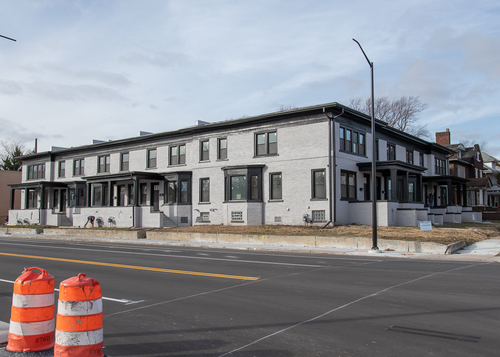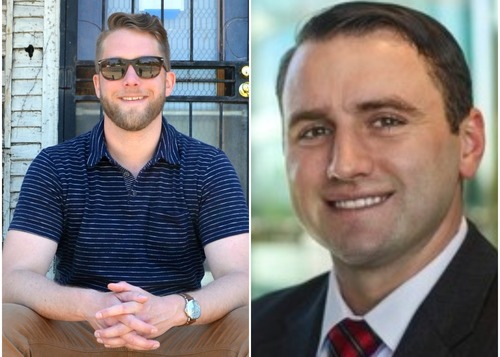
Townhomes being developed by Astral Weeks at 2119 Field Street. (Photo Michael Lucido)
A high-profile dispute between a Detroit developer and an activist neighborhood association appears to have been at least partially resolved, with both sides getting some, but not all, of what they wanted.
The squabble was over a derelict strip of row houses in Detroit’s Islandview neighborhood, which became a flashpoint in the debate over gentrification after a developer requested a tax break to transform them into more upscale townhomes.
The neighborhood group, the Charlevoix Village Association, objected, saying the planned rentals weren’t affordable enough and risked raising property values and pricing out longtime residents.
They scored a victory against developer Astral Weeks when they learned the company was the investor on a separate project in the neighborhood that had accrued more than $38,000 in unpaid blight tickets, prompting the city to pull its tax-break request and sign a contract with the company’s partner, landlord-developer Reimer Priester, to get the troubled project in compliance.
Nine months later, Astral Weeks has been approved for the roughly $600,000 in subsidies it wanted for the townhomes at Kercheval and Field, while Priester has made progress improving conditions at the other project — the rehab of 50 homes known as the Detroit Village Initiative.

A home renovated as part of the Detroit Village Initiative. (Photo: Astral Weeks)
Though Priester did miss the contract’s November deadline to obtain certificates of compliance at the majority of the rental houses, the city says it's satisfied with his progress and that he’s in the final phases of getting the properties up to code.
Priester has paid the majority of the blight tickets, which at one point totaled more than $50,000, with the city poised to waive the overwhelming majority of a remaining $20,000 if he meets certain requirements. However, he has accrued an additional $2,600 in outstanding tickets since the agreement was signed in late February.
The lack of repercussions for Priester and awarding of benefits to a connected developer are in keeping with a broader pattern of flexibility by the city for businesses willing to invest in Detroit. It’s a balancing act often met with criticism from residents and neighborhood advocates who find the city too forgiving, as when, earlier this year, it dropped a controversial speculator from a banner lawsuit after he rehabbed just 10 vacant houses in a portfolio of more than 350 properties.
But leniency can also help the city toward its ultimate goal of increasing tax revenues. Astral Weeks and Priester, despite the shortcomings of their Detroit Village Initiative, have done a lot of good by this measure, bringing higher-income earners to an area once devoid of investment and helping spur new economic activity.
In emailed statements, an Astral Weeks spokesman and a city development official said the company is not responsible for the remaining issues at the Detroit Village Initiative project with Priester because it is only an investor and does not have final say in decision-making. The city and Priester both say they expect the houses will soon be in compliance and blamed Covid for delays.
Despite that Priester’s agreement with the city was already extended by three months to account for the pandemic, Detroit Buildings, Safety Engineering and Environmental Department project manager Julie Vande Vusse said the city would not take action against him “given (he) did sign the consent agreement.” The agreement warns the city can sue if its terms aren’t met.
But some don’t see the benefits of this business-as-usual approach, and believe the city should have at least waited to learn the fate of the troubled properties before issuing the subsidies.
“They shouldn’t have given nobody no money until they cleaned up their mess,” said Toyia Watts, a longtime neighborhood resident and president of Charlevoix Village Association, the group that discovered the blight tickets and fought against subsidies for the townhome project at Kercheval and Field. “If that’s the case, then everybody can come in and leave their properties blighted and ugly … Hell no. I’m really pissed.”
The partnership

Reimer Priester and Alex DeCamp. (Photos: LinkedIn)
The Detroit Village Initiative launched in 2015 as a joint venture between Astral Weeks, Priester and Alex DeCamp, after the trio together “identified the opportunity to rehabilitate a large number of vacant homes," a cached version of the project’s now-private website says.
The goal was to “positively effect”(sic) the neighborhood through “high-quality renovations” of at least 50 vacant, often blighted, houses it would eventually rent out or sell. Priester purchased more than 140 properties in the area around that time, often for cheap at the Wayne County Tax Foreclosure Auction.
But as many of the properties sat vacant and blighted, neighbors and activists began accusing the group of speculation. The city, meanwhile, ramped up code enforcement as part of an aggressive citywide campaign to get landlords to follow the rules, leading to a crush of tickets at the group’s houses and vacant lots. This summer, with the properties not up to code, tenants escrowed rent as part of a strike that lasted six months and ended with a deal they say prevented union members from getting evicted.

One of dozens of vacant homes owned by Priester. (Photo: Michael Lucido)
Under the city campaign, the group’s rentals were technically supposed to be in compliance by Sept. 3, 2019 — the deadline for those in the rest of the neighborhood. As of Dec. 15, 15 of 20 occupied rentals owned by Priester had still not received certificates of compliance — meaning they’d not been brought up to a standard to have people living in them legally.
But despite the delays, Priester says he’s done substantial cleanup in the area since entering the agreement with the city, removing overgrowth, trash and debris and boarding up and securing the vacant properties. Tenants concur, and credit their activism and the Charlevoix Village Association’s.
“It’s without a doubt the work of CVA and our strike that did this,” said tenant Geoffrey Leonard. “No one had come by to do any of these repairs until our strike. Part of the reason we went on strike is we found out about this agreement.”
City lobbies for deal
The city did not wait to see if Priester lived up to his promises before resurrecting the tax break request for his partner, Astral Weeks.
The revamped version of the proposal passed City Council in a 7-2 vote July 28, after city officials touted the compliance agreement with Priester and the addition of slightly more affordable housing to the project at Kercheval and Field — from two units affordable for individuals earning $44,000 per year, to one unit affordable for individuals earning $27,000.
Astral Weeks was seeking Brownfield Tax Increment Financing to capture $277,000 in increased property taxes from the $2.5 million project — a reimbursement for environmental costs. Council had already approved a separate Obsolete Property Rehabilitation Tax Abatement valued at an estimated $325,000 in 2019.
Though city officials put support for the tax break among community members at about 50-50, the city took the unusual step of lobbying for the proposal on top of its standard outreach. Housing and Revitalization Department director Donald Rencher said his staff drafted boilerplate letters of support for the project it then had residents sign, in a move that drew a rebuke from Councilmember James Tate.
“I can’t stand form letters,” said Tate. “If there’s individuals who actually feel a certain way about something, let them express it. Because if you’re preparing a form letter for support, you should also create one, in fairness, in opposition ... to get a full representation.”

Donald Rencher.
In selling the tax break proposal, Rencher also downplayed the developer’s connections to the troubled Detroit Village Initiative.
“Astral Weeks, who is the developer of this project, has no blight tickets,” he said. They’re “a passive investor in another project that did have blight.”
But a company’s track record should be considered in its totality when deciding whether to award incentives and other public benefits, said State Rep. Yousef Rabhi (D-Ann Arbor), who previously served on the Washtenaw County Brownfield Redevelopment Authority.
“I think it’s all connected,” Rabhi said. “Anything in a company’s history is important to consider. Because it’s public money and if a developer is failing to follow the law in one segment of its portfolio, it could speak to potential issues with the project up for consideration, whether it be a lack of liquidity or civic (conscience).”
Astral Weeks has completed several projects in Brooklyn, New York. In addition to the townhomes it’s developing on Kercheval, it has had plans for a residential project in Brush Park since 2016 and in 2018 submitted a concept to the city for a development at 16th and Bagley streets, near Ford’s coming mobility campus.
Joshua Valiquette contributed to this report.


 by
by







